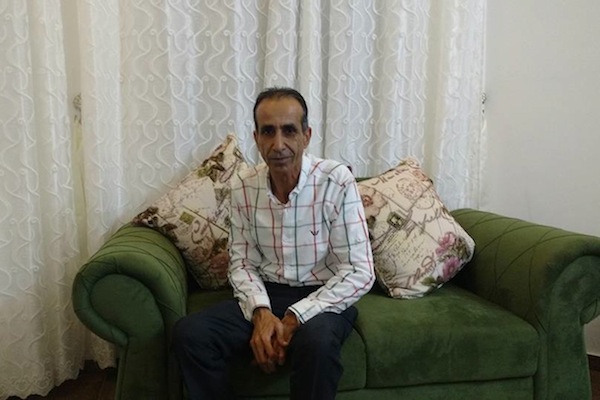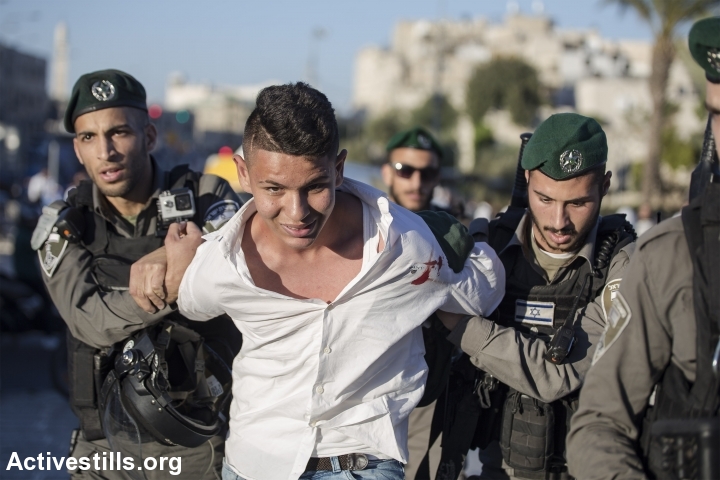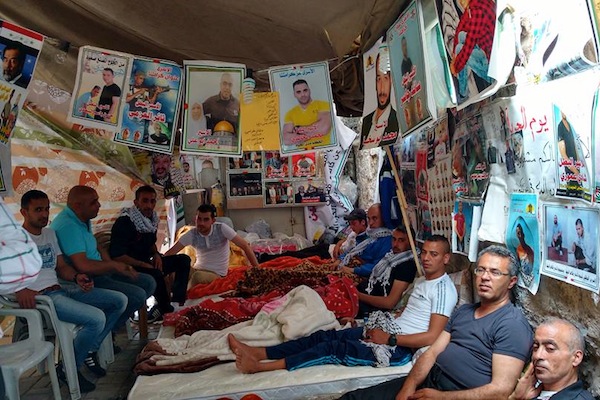He entered prison for the first time at the age of 10, was one of the founders of the Al-Aqsa Martyrs’ Brigades, and became one of the representatives of Fatah’s security prisoners in Israeli jails. For the last decade, Ramzi Fayyad, who has been working to promote dialogue between representatives of released prisoners, views the the current hunger strikes as an opportunity. Orly Noy spoke to him about prison conditions, the failure to learn from past mistakes, and why the strike could help Palestinians on a global level.

The hunger strike organized by Palestinian prisoners in Israeli jails has been going on for four weeks, and as anticipated, after the initial uproar in the media, has fallen out of the public eye in Israel. This itself is an expression of the occupier’s authoritarian arrogance: the deep indifference to the political and social drama unfolding on the streets of Palestine, which we are only interested in, if at all, when it has to do with “terrorists” who dare to demand satellite channels in their cells.
From the first day, the strike reminded me of one name: Ramzi Fayyad, a former security prisoner who I used to interview 12-13 years ago, on a radio show I hosted at the time. Ramzi would speak to us from time to time from from Ktziot Prison, talking about the conditions of the prisoners, and Palestinian politics more generally. I owe some of my deepest insights to these conversations. Over the years, we developed a real friendship, and through friends from the outside we exchanged photos of family, letters, and children’s gifts. We haven’t spoken for a long time, Ramzi and I. The hunger strike brought me right back to our discussions, and after a short conversation we agree it is time to meet up again after all these years. He cannot enter Israeli territory, so I drove to visit him and his family in Jenin.
Ramzi waits for me at Huwarra. Even though the years in jail have left a clear mark on him, I immediately recognize him from the photographs, and the meeting is incredibly moving. He pulls out a thermos and two glasses out of his car, pouring us coffee, “welcome coffee” and we set off. Ramzi is married and has two sons – Osama, the eldest at 16, who was a baby in the photos Ramzi had once sent, and Alaa, his nine year-old son who was born after Ramzi’s release. Until recently, Ramzi lived in Jenin refugee camp, but two months ago he and his family moved into the city itself.
Like many Palestinians in his generation, the story of Ramzi’s life is the story of resistance to the occupation. His first memory is the demolition of his home at the age of three. “The first time I went to jail I was 10 years old. I was held for a day for throwing rocks. They caught me and beat me on the legs with a stick. They asked me what my name was, and even though my name was written all over my notebooks, I gave them I different name. I didn’t say a word about the other kids who were with me.”
“The second time I was the same age as Osama. We threw a Molotov cocktail, and the next day they came to take us from our home. This was the first time I was interrogated. The Shin Bet agent told my mother, ‘Say goodbye to your son, you won’t see him for three more years.’ From the age of 16 to 19, during his imprisonment, Ramzi joined Fatah, and when he left prison at 19 he was already a Fatah representative in the refugee camp.
When the Second Intifada began, Ramzi became one of the first members of the al-Aqsa Martyrs’ Brigades and was added to Israel’s wanted list. During “Operation Defensive Shield” in 2003, he was captured again and spent three-and-a-half years in administrative detention. “My son, Osama, was then six months old. When he came to visit me in Ktziot for the first time – without Lina, his mother, since she didn’t have a permit – he was a year-and-a-half old and had no idea who I was. When he saw the prison manager with me he cried, ‘Jew, Jew,’ and moved away from me. Later, we managed to organize visits with Lina and then he learned to recognize me as his father.”
Since his release in 2005, Ramzi’s primary job has been the promotion of dialogue between leaders of the various factions in the West Bank, all of them former prisoners. As far as he is concerned, this is his life’s project.
“In prison there are conflicts between members of the various factions, but disputes are resolved with dialogue. This is why I am focusing on talking to former prisoners about an agreement between Fatah and Hamas, because prisoners have been engaging in dialogue for years – with each other and with the administration. They use their intellect, and they know how to negotiate. I acquired a lot of use of these skills while representing Fatah’s prisoners, and ultimately managed to reach many agreements with the prison’s administration.
“There is huge potential in the Palestinian prisoner population. They have respect in the street, and the leadership cannot go against them. We’re also much more connected to the terrain – as a former prisoner I visit families, feeling the pulse, something the leadership has long been unable to do. We’ve already reached a place of close and honest dialogue, including a few significant agreements. Of course, if these on-the-ground leaders reach agreements that hurt the interest of their political leaders, they will stop the shift. But these people speak a very similar language because of their years in prison, so much so that if you listen without knowing, you can’t tell who is Fatah and who is Hamas. That’s the dream: that we will finally be able to speak one language.”
Quickly, Ramzi moves on to the Palestinian Authority. As expected, his critique is scathing.
“Abbas is lying to Palestinians. He says his goal is a Palestinian state, but what he really wants to achieve is a kind of economic peace. At least Israel says it frankly: no Palestinian state, ever. Today, Israel has an opportunity to move from managing the conflict to ending it. The Israeli state is strong, the Palestinian street is weak and divided, and the Arab states want to ally with Israel against Iran. So Israel says, a Palestinian state? There is one in Gaza. In the West Bank there’ll be a few administrations: Jenin, Ramallah, etc., and within each a few powerful families that Israel will negotiate with directly. And the Palestinian government cooperates because their money and this entire economy depends on income from Israel and the United States. People will do anything to maintain their livelihood. The killing of Basil al-Araj didn’t surprise me. Security coordinstion is the only link that Israel has to the PA; the rest it does directly with people on the ground.

“Occupation is occupation. Okay. But we as Palestinians have also failed. We are protecting things that we should not be protecting, like corruption for instance. My greatest success in prison was that everybody knew that I don’t ever lie. If this is our framework, we will succeed. And we have failed in other ways. It’s not only you Israelis who have gone crazy, but also us. There has been mistake in the struggle: fighting against civilians is a mistake. Children who wield knives are a big mistake. At the end of the First Intifada, I was one of the people who made the mistake of taking on the armed struggle. It left out everybody who was did not have weapons, and the 100 people with weapons became 80, then 60, and then the struggle disappeared. And this gave Israel an excuse to finish the job. All over the world today comes stems in the streets, and if all the Palestinians would take to the street for a week the occupation would be over. But as Palestinians, we’ve never held an internal dialogue to figure out where we went wrong, or to learn from past mistakes.”
“During the First Intifada, the leadership was connected to the situation on the ground – much more than they are now. During the Second Intifada, the leadership – both Fatah and Hamas – followed us, the people on the ground, which was a major problem. It was we who should have followed them, that is the meaning of leadership. We have not produced the kind of leader who can tell people to leave their home and they leave. Barghouti is half-way there, but we do not have anyone in the order of Nelson Mandela or Khomeini. Abbas is incredibly weak; the only power he has is the economy of the Palestinian Authority that he maintains, but people do not trust him. We have leaders, but no leadership. If Marwan leaves prison now he will not win Fatah’s elections; he only succeeded because he was inside the jail. We have no long-term vision, and this is what I’m trying to develop with a group of ex-prisoners. To think about where we want to be, not in a year or two, but where we want to be in 20 years. I’ve been doing this work for a decade, and it’s incredibly frustrating. We go one step forward and immediately take three steps back. I have to say that the Israeli leadership is more honest with its people than the Palestinian leadership. They speak in one voice. Meanwhile, the Palestinian leadership opposes the hunger strike because it strengthens Marwan, but publicly supports it.”
We are sitting in his guest room in their beautiful home in Jenin. Lina, his wife, occasionally joins the conversation. She was very young when they married, and quickly found herself alone with a small infant, when Ramzi was imprisoned. Meanwhile, the two sons, Osama and Alaa come home from school. They shake my hands out of politeness and open curiosity.
“You should know we had a real debate over what to tell them before you arrived. They have never met Jews before. Osama had already heard many stories about you, he’s familiar with you, but Alaa, we didn’t know what to tell him. He’s a child, he knows that his father sat in prison for many years, he hates Abbas and believes in armed resistance. I told him you were a friend of mine, and that you helped me a lot in prison. He didn’t say anything, but later I heard him saying to his cousin ‘Come to our place, there’s a Jewish reporter’ – you know, they don’t say Israelis, they say Jews – ‘But she’s more of a friend to Palestinians more than to Israel!’ I’m glad he thinks of these things on his own, and I’m trying not to influence him to think in any one way. At this age his father is holy to him, and I want him to decide things for himself.”
After lunch, we return to talking about the prisoners’ strike. Ramzi has high hopes for its success.
“The strike is strengthening relations between factions. It will succeed if there is a popular revolution, or if the Palestinian Authority stops security coordination with Israel. It currently includes 1,100 Fatah prisoners, 200 from the Popular Front for the Liberation of Palestine, 150 from Islamic Jihad, and 150 from Hamas. At first Hamas opposed the strike, but because of the pressure they’re facing in Gaza I think it is possible Hamas will take its people out into the streets and present itself as a defender of the prisoners.

“I’m optimistic about this strike. The Palestinian street has been waiting for a long time for some kind of step, and this move came at the right time. It strengthens the political position of Palestinians, strengthens the street which is in unanimous support of the prisoners, encourages the factions to move towards unity, and ultimately helps Abbas – it’s a strong hand to play globally. The first success of the strike will be the rise of popular struggle, but the really momentous success would be achieving an agreement between Fatah and Hamas, and then holding elections. It is still far away, but I believe that there will be surprises. If they feel like they’re losing the support of the streets, they will do it. Otherwise we, God forbid, will find ourselves in an internal war, or Hamas will embark on a round of violence against Israel. Both of these situations are very bad for the Palestinian people.”
Israel is taking a hard line with these prisoners. Do you think the state could succeed in breaking them?
“I don’t think so. Look, these people don’t have anything to lose. When I was hunger striking, they threatened to worsen our conditions, and some people abandoned the strike. But all those conditions have already been taken away from prisoners today, so why should they break? Beyond that, the experiences of individual hunger strikers has taught the prisoners a lot. They know exactly how long they can survive and how. I was a hunger striker myself, and I know that you do not die from striking so quickly. The second and third days are incredibly difficult, but afterwards the body gets used to weakness and learns to live with it. I don’t think it’s worth it for Israel to see publicized photos of hospitalized prisoners, maybe it’s better to give them a radio and let them talk on the telephone once a month. As long as this strike lasts, Israel will pay a heavy political price. Personally, I hope this strike will continue at least another month. It gives us an opportunity to do work in the street, there is a feeling that something is stirring.”
At the end of our conversation, Ramzi and his family take me for a ride around Jenin. We drive through the refugee camp, which the family recently left, and they show me where the tanks came from during Operation Defensive Shield. “Almost everything you see here was rebuilt after it was destroyed,” Ramzi says. From there we drive to the city center, where the big support tent for striking prisoners stands. Some former prisoners began their own hunger strike two days ago there, in solidarity with friends on the inside. In order to truly understand the importance of this strike to the Palestinian streets, you have to see the bustle inside this tent.

Afterwards, we go to see the cemetery, and the section that was added to it during Operation Defensive Shield. Then, we have a short picnic in the huge grove next to where the settlements Kadim and Ganim used to stand before they were removed in 2005. Throughout the entire time the settlements were here, they explain, Palestinians were forbidden from entering this grove, which is larger than the refugee camp. Lina picks some fragrant leaves for tea, and an excited Alaa goes for a short drive in his father’s car. He offers me a spin, and I turn pale and refuse with a big laugh.
At the end of the day, they accompany me up to the road to Hawwara: Ramzi and his family in the front, and me in a car in the back with nine year-old Alaa, who has chosen to keep me company, as we traverse the incredibly mountainous terrain of Nablus. He’s an incredibly smart boy, cheerful and open. On the way, he tells me about his class trip to Qalqiliya, about the puppy they recently adopted, about his favorite television shows, and about his classmates. I ask what he wants to be when he grows up. “A doctor,” he immediately answers. What kind of doctor? “A cardiologist,” he answers after briefly reflecting. We talk a bit about the difference between the heart and the brain. In the end, right before we go our separate ways, he says, “Isn’t it true that you can’t live without a brain or a heart, but without a brain you can’t think and without a heart you can’t feel. But if I need to choose, I still think that I’d prefer to be a heart surgeon.”
This post was originally published in Hebrew on Local Call.

